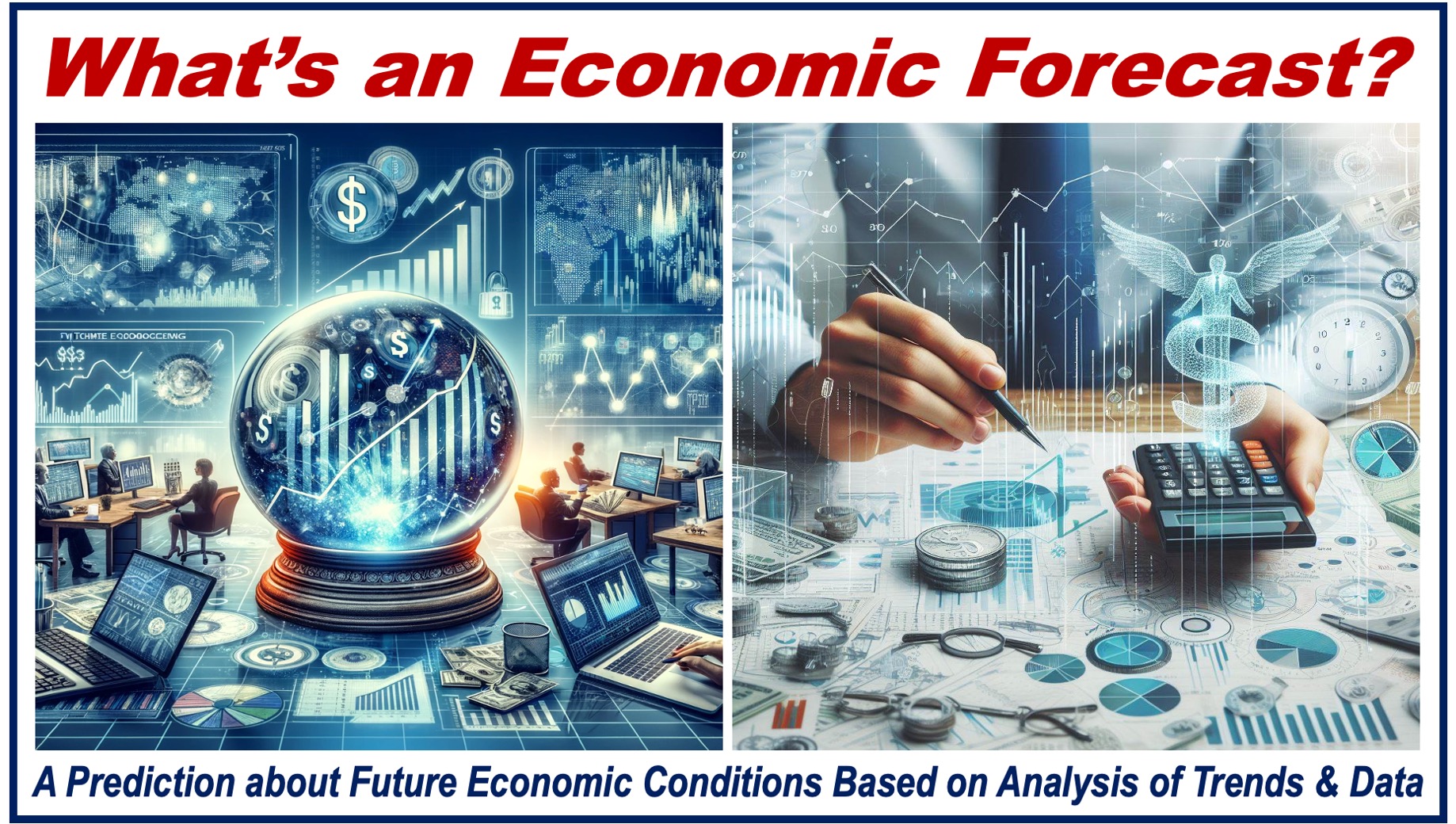What is an Economic Forecast?
If you are an economist and you are gathering and analyzing economic data to be able to predict what will happen in the future, you are creating an Economic Forecast.
Economic forecasts are based on a wide range of data, including the economy’s current state, trends, what happened recently, and external factors.
The process of making forecasts about the economy is Economic Forecasting.
The Cambridge Dictionary has the following definition of the term “economic forecast,” plus an example sentence:
“A statement of what is judged likely to happen in the future of a particular economy. Example Sentence: ‘The Chancellor (Finance Minister) has stuck to optimistic economic forecasts.'”
Economic forecasts matter to many people
So, why are economic forecasts important? Companies, governments, investors, and many other organizations and people use these forecasts to make informed decisions.
For instance, if you are a businessperson, you may use an economic forecast to decide whether to invest in expanding production capacity or new products.
If the forecast predicts a strong economy, with increasing consumer spending and confidence, you might consider investing in boosting production capacity to meet the anticipated higher demand.
Conversely, if the forecast suggests a shift in consumer preferences or the emergence of new market trends, you may decide to invest in developing new products that align with these future changes.

Creating economic forecasts
Economists gather and analyze many aspects of the economy before making a prediction. They look at:
- Gross Domestic Product (GDP): The total value of goods and services that a country produces over a specific period.
- Employment Rates: The percentage of the labor force that is employed.
- Inflation Rates: The rate at which prices for goods and services rise.
- Consumer Confidence: A measure of how optimistic consumers are about the overall state of the economy and their own financial situation.
- Business Investment: How much businesses are spending on physical capital, such as machinery and buildings.
- Government Fiscal Policy: Government spending and tax policies, which can stimulate or slow down the economy.
- Monetary Policy: Central bank actions, including interest rate adjustments and changes in the money supply.
- Balance of Trade: The difference in value between a country’s imports and exports.
- Currency Strength: The value of the nation’s currency in relation to other currencies.
- Retail Sales: The total receipts at stores (shops and supermarkets).
- Industrial Production: The total output of a country’s manufacturing, mining, and utilities.
- Housing Market Indicators: Includes new home sales, building permits, and housing starts.
- Stock Market Trends: The general direction of the stock market, which can indicate investor confidence and economic health.
- International Events: Events such as political unrest, trade agreements, trade embargoes/wars, or global pandemics.
- Energy Prices: Costs of energy sources like oil, gas, coal, renewable energy, and nuclear power.
- Technological Advances: The rate at which technology is progressing and impacting productivity and employment.
- Consumer Debt Levels: The more consumers owe, the less they are likely to be spending.
- Manufacturing Data: Surveys and indices that tell us about the health and expansion of the manufacturing sector.
Accuracy
Economic forecasts are not set in stone, that is, there is no guarantee they are 100% accurate. They should be understood as well-informed estimates. However, sometimes they are wrong.
Economists make these predictions based on available data and evidence, using analytical methods instead of mere speculation.
Often forecasts are revised a few weeks or months later if, for example, new data emerges.
-
Weather forecast analogy
They are a bit like the weather forecast. Just as meteorologists make predictions after analyzing current weather data, economists examine current economic data to make predictions about the economy.
However, the economy, just like the weather, can be unpredictable.
Economic forecasts not all the same
Different organizations may have different economic forecasts. They do not all prioritize the same set of economic indicators or components to make their predictions.
It’s not unlike having different weather apps on your phone – their forecasts are not identical.
You don’t need to have a degree in economics to understand economic forecasts. Many of them are presented in a way that is accessible to non-experts.
Well-known economic forecasts
Below is a list of the most respected/popular economic forecasts around the world:
- The International Monetary Fund (IMF) World Economic Outlook
Provides analysis and forecasts of economic developments and policies in its member countries and globally. - The World Bank Global Economic Prospects
Offers global economic forecasts with a focus on the economies of developing countries. - The Organisation for Economic Co-operation and Development (OECD) Economic Outlook:
Presents analysis and forecasts for the economies of the OECD member countries and selected non-member countries. - The Conference Board Economic Outlook:
U.S.-based, but provides a global outlook, including detailed forecasts for major economies. - The National Institute of Economic and Social Research (NIESR) Global Economic Forecasts:
UK-based, offering global economic forecasts with a focus on the UK economy. - The Kiel Institute for the World Economy (IfW Kiel) World Economic Outlook:
Germany-based, offering insights into the global economy with a European focus. - The Institute of International Finance (IIF):
Provides global financial industry perspectives, including economic forecasts. - The Peterson Institute for International Economics:
U.S.-based, offering global economic policy studies and forecasts. - The Economic and Social Research Institute (ESRI):
Ireland-based, providing national and international economic analysis. - The Centre for Economics and Business Research (CEBR):
UK-based, offering economic forecasting and analysis globally. - The Brookings Institution:
A U.S.-based think tank providing research and analysis on a wide range of economic topics globally. - The China Center for International Economic Exchanges (CCIEE):
China-based think tank offering insights and forecasts concerning China’s economy and its global impact.

